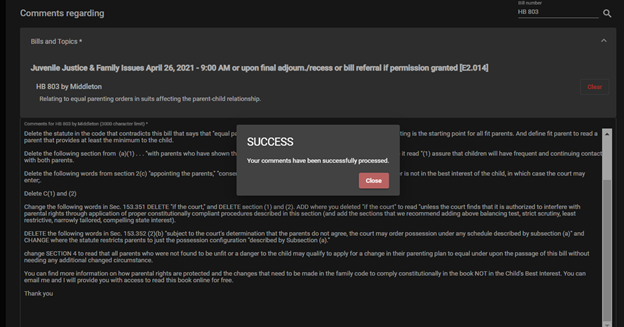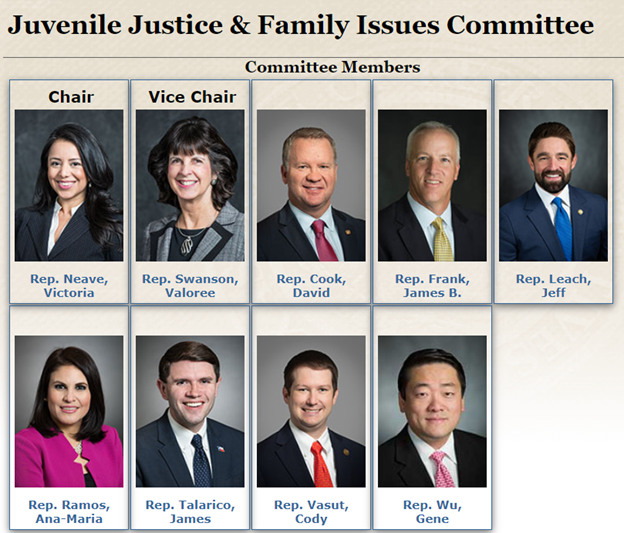Testimony on No-Fault Divorce bills in Texas
Testimony on Equal Parenting Bill HB803 in Texas
[/et_pb_text][/et_pb_column][/et_pb_row][et_pb_row column_structure=”1_2,1_2″ _builder_version=”4.16″ _module_preset=”default” global_colors_info=”{}”][et_pb_column type=”1_2″ _builder_version=”4.16″ _module_preset=”default” global_colors_info=”{}”][et_pb_code _builder_version=”4.16″ _module_preset=”default” custom_margin=”||-159px|||” global_colors_info=”{}”][/et_pb_code][/et_pb_column][et_pb_column type=”1_2″ _builder_version=”4.16″ _module_preset=”default” global_colors_info=”{}”][et_pb_code _builder_version=”4.16″ _module_preset=”default” global_colors_info=”{}”][/et_pb_code][/et_pb_column][/et_pb_row][/et_pb_section][et_pb_section fb_built=”1″ _builder_version=”4.16″ _module_preset=”default” global_colors_info=”{}”][et_pb_row _builder_version=”4.16″ _module_preset=”default” global_colors_info=”{}”][et_pb_column type=”4_4″ _builder_version=”4.16″ _module_preset=”default” global_colors_info=”{}”][et_pb_text _builder_version=”4.16″ _module_preset=”default” min_height=”5672.8px” global_colors_info=”{}”]
Texas Equal Parenting Bill HB 803 gets a hearing.
Before you testify on this shared parenting bill, there are a few things you should know.
Legislative council put a bunch of exceptions into the language of the bill. If the parents don’t agree, the judge can deny the parents equal parenting. If the judge decides its not in the best interest of the child, equal parenting can also be denied.
Does this Bill Passing Guarantee that I will get Equal Parenting?
There is still no guarantee that you will get an equal parenting plan as the starting point. You will still have to spend a ton of money fighting for it if the other parent doesn’t agree and if the judge doesn’t agree. Yep, you heard that right, two agreeing parents can have their agreement denied if the judge decides it’s not in the best interest of the child.
Does this Bill Reduce the Cost of Child Custody Litigation?
The court can still continue to appoint others to determine what is your child’s best interest. This is because there is nothing in this bill that protects fundamental parental rights. That does not mean that you cannot insist that your attorney protect your and your child’s rights.
Why all the exceptions for this parenting plan in the current equal parenting bill in Texas HB 803?
You would have to ask legislative council. However, we can take a guess that in order to satisfy the many objections that equal parenting bills have received in Texas in the past, they most likely put in the exceptions to satisfy those that don’t believe that parents in disagreement should have equal parenting, and to satisfy others who believe that an arbitrary best interest of the child standard trumps parental rights. This bill continues to codify the discriminatory practice that parents who separate can have their child separated from them and that their rights are not individual but are tied to the whims of a judge and the desires of the other parent. You should still support the passage of the bill. Just be aware that the battles in the courts are not over and the battles with the legislators are not over. There is still a lot of work to do to get these civil rights protected properly. Once they are, child custody battles between two fit parents will be the exception and not the norm.
This bill just codifies what you already have a right to. You have a right to equal parenting, your child has a right to its parents having equal parenting.
This bill also perpetuates unconstitutional practices of using best interest of the child to override parent agreements.
You can Ask for Amendments to the Equal Parenting Bill
Ask the legislators to repeal the following section in the Texas Family Code for obvious reasons:
Sec. 153.135. EQUAL POSSESSION NOT REQUIRED. Joint managing conservatorship does not require the award of equal or nearly equal periods of physical possession of and access to the child to each of the joint conservators.
Where do I go to Testify on this Bill?
You can testify on this bill online here now. Texas residents who wish to electronically submit comments related to agenda items on this notice without testifying in person can do so until the hearing is adjourned by visiting: https://comments.house.texas.gov/?c=c340
You can testify on this bill in person in Austin, Texas on April 26, 2021 at 9 a.m. in Room E2.014. This is the house Juvenile Justice & Family Issues Committee hearing.
What Happens if I Cannot Make it in Person to Testify?
You can register your testimony online and it will be printed and considered along with the rest of the oral testimonies they receive that day. Just make sure you do it before the day and time of the hearing. You can go here to register and submit your testimony on this bill.
I suggest that you also email your testimony to all of the JJFI legislators to ensure that they get it.
Then you should follow up your letter of testimony submission with a phone call to their office and let their staff know that you have emailed it and would like them to print and make sure that the legislator knows about it.
What does this mean for you if the bill passes?
I am not anticipating this bill having any trouble getting passed since it does not mandate equal parenting, it just provides an option (not that you didn’t already have the option). It helps attorneys feel more comfortable to push for equal parenting when it is codified in your state statute and part of the public policy.
This bill also has another effect. It might solve the courts ordering joint physical custody like it is meaningless. In the past, judges would order joint custody but still only grant the standard possession order of every other weekend and one night a week. However since the bill does change joint physical custody to equal, a joint custody plan will reflect an equal parenting plan. That will be less confusing to parents who go through SAPCR litigation in the future since most parents new to divorce don’t know that joint doesn’t mean equal. So from that perspective this bill would resolve that issue.
There might also be an unintended effect from the language in this bill. What you might expect to see after this bill passes if perhaps fewer joint physical custody orders if a judge wants to avoid awarding an equal parenting plan.
Does this Mean I can File for a Modification and Get an Equal Parenting Plan Now?
No. HB 803 specifically addresses this issue and does not allow parents to use the passage of this bill as a reason to go back to court to change an order they got prior to this bill passing. This doesn’t mean that there is no way to modify. It just means that you cannot use the passage of this bill as a reason, as a changed circumstance. And if the bill doesn’t pass, don’t fret, you already have the right to an equal parenting plan. This bill just makes it easier for parents to find an attorney to fight for an award of an equal parenting plan according to the crappy way that Texas continues to force parents to go through high conflict child custody litigation. Unfortunately, the bill doesn’t do anything to correct the adversarial nature of child custody battles or the procedures applied to family law domestic relations custody suits.
SECTION 4. The enactment of this Act does not constitute a material and substantial change of circumstances sufficient to warrant modification of a court order or portion of a decree that provides for the possession of or access to a child rendered before the effective date of this Act.
SECTION 5. The change in law made by this Act applies to a suit affecting the parent-child relationship that is pending in a trial court on the effective date of this Act or that is filed on or after the effective date of this Act.
Is it too late for this bill to get through the entire process?
If there is a bill that the legislators really want passed, they will see it through. This bill does have a lot of steps that it would have to make it through before the 87th legislative session ends this year, despite the bill was filed on December 11, 2020. The bill had not been scheduled for a hearing by House Representative Victoria Neave until now. And this comes after Fox news aired the story last week that the equal parenting bill was not moving forward because it was still waiting on a hearing.
Texas parents have fought for equal parenting bill hearings before, and even bills that got hearings they did not pass. Representative Harold Dutton one year refused to schedule a hearing after he said that legislators had been threatened.
The bills in the past did not have as many co-sponsors on them. This bill has 21 and it is slightly bi-partisan, with the majority of its supports being Republican. Middleton is the primary sponsor of this bill.
How Can You Increase the Likelihood that this Bill will Pass?
If you do submit your testimony in writing online, feel free to post your testimony here to help encourage other parents and give them ideas on what they want to testify about. It also helps to know what is being covered and what has not, so that the next parent can make sure to cover topics or issues that were not covered in your testimony. Doing this can increase the likelihood that this bill will get passed.
What is the Next Step for this Bill?
This is one step for this bill. Then it gets sent either to calendar committee or to the Senate. Where it is sent is dependent on how many votes the bill gets. There are a lot of steps involved in passing a bill after it gets filed. The bill has to pass the house and the senate committees before it goes to the full floors for votes. if the bill is amended on either the house or senate floor or gets amended in the senate committee after it passes the house committee, the bill would have to go back to the house to vote on the amendments. So the bill could have a lot of steps to pass through before becoming law. So you will need to stay on top of your legislators and encourage them to keep the bill moving through. And this bill will have to do so fast since the entire 87th legislative session will conclude on May 31, 2021. You find out a lot more information about legislative session schedules on the Texas Legislature government page.
There are plenty of groups that you can stay in touch with who can help you with taking the steps necessary to do this.
When will this bill go into effect if it passes?
September 1, 2021. Remember the Governor has to sign it before it becomes law. But as long as he signs it, it becomes effective on the date above. If you have a child custody suit pending and a hearing scheduled before September 1, 2021 ask for your case to be continued until after this date so that you can receive the benefit. However, you can ask your judge to recognize that this bill is likely to pass and ask if the judge would consider ordering a parenting plan according to the language in this bill if you are unable to get a continuance.
You can read the full text of the bill, HB803 here: https://capitol.texas.gov/billlookup/Text.aspx?LegSess=87R&Bill=HB803
[/et_pb_text][et_pb_code _builder_version=”4.16″ _module_preset=”default” global_colors_info=”{}”][/et_pb_code][/et_pb_column][/et_pb_row][/et_pb_section][et_pb_section fb_built=”1″ _builder_version=”4.16″ _module_preset=”default” global_colors_info=”{}”][et_pb_row column_structure=”1_3,1_3,1_3″ _builder_version=”4.16″ _module_preset=”default” global_colors_info=”{}”][et_pb_column type=”1_3″ _builder_version=”4.16″ _module_preset=”default” global_colors_info=”{}”][et_pb_text _builder_version=”4.16″ _module_preset=”default” global_colors_info=”{}”]
Text of the bill HB 803
[/et_pb_text][/et_pb_column][et_pb_column type=”1_3″ _builder_version=”4.16″ _module_preset=”default” global_colors_info=”{}”][et_pb_text _builder_version=”4.16″ _module_preset=”default” global_colors_info=”{}”]
Testimony Filed by Sherry Palmer on HB 803
[/et_pb_text][/et_pb_column][et_pb_column type=”1_3″ _builder_version=”4.16″ _module_preset=”default” global_colors_info=”{}”][/et_pb_column][/et_pb_row][et_pb_row _builder_version=”4.16″ _module_preset=”default” global_colors_info=”{}”][et_pb_column type=”4_4″ _builder_version=”4.16″ _module_preset=”default” global_colors_info=”{}”][et_pb_text _builder_version=”4.16″ _module_preset=”default” global_colors_info=”{}”]
I support HB 803 with the following amendments. Add the following to the public policy that it is every child’s right to equal parenting with their fit parents, that it is presumed that every parent is fit, and that each parent is presumed to act in the child’s best interest, that parents are not required to get along to have equal parenting. Add that it is the policy of this state to require strict scrutiny before interfering with parental rights. Add that it is in the best interest of the child to protect parental rights.
Next delete that a judge may override the agreement of parents based on best interest of the child.
Add that a judge may not use best interest of the child to interfere with fundamental rights until the proper constitutionally compliant process is applied: compelling state interest, least restrictive, narrowly tailored, and application of Mathew’s balancing test.
Delete the statute in the code that contradicts this bill that says that “equal parenting is not required.” Change that section to Equal parenting is the starting point for all fit parents. And define fit parent to read a parent that provides at least the minimum to the child.
Delete the following section from (a)(1) . . . “with parents who have shown the ability to act in the best interest of the child; and just have it read “(1) assure that children will have frequent and continuing contact with both parents.
Delete the following words from section 2(c) “appointing the parents,” “conservators,” and DELETE “unless the court determines that order is not in the best interest of the child, in which case the court may enter;.
Delete C(1) and (2)
Change the following words in Sec. 153.351 DELETE “if the court,” and DELETE section (1) and (2). ADD where you deleted “if the court” to read “unless the court finds that it is authorized to interfere with parental rights through application of proper constitutionally compliant procedures described in this section (and add the sections that we recommend adding above balancing test, strict scrutiny, least restrictive, narrowly tailored, compelling state interest).
DELETE the following words in Sec. 153.352 (2)(b) “subject to the court’s determination that the parents do not agree, the court may order possession under any schedule described by subsection (a)” and CHANGE where the statute restricts parents to just the possession configuration “described by Subsection (a).”
change SECTION 4 to read that all parents who were not found to be unfit or a danger to the child may qualify to apply for a change in their parenting plan to equal under upon the passage of this bill without needing any additional changed circumstance.
You can find more information on how parental rights are protected and the changes that need to be made in the family code to comply constitutionally in the book NOT in the Child’s Best Interest. You can email me and I will provide you with access to read this book online for free.
Thank you

[/et_pb_text][/et_pb_column][/et_pb_row][et_pb_row _builder_version=”4.16″ _module_preset=”default” width=”100%” global_colors_info=”{}”][et_pb_column type=”4_4″ _builder_version=”4.16″ _module_preset=”default” global_colors_info=”{}”][et_pb_text _builder_version=”4.16″ _module_preset=”default” global_colors_info=”{}”]
A BILL TO BE ENTITLED AN ACT relating to equal parenting orders in suits affecting the parent-child relationship. BE IT ENACTED BY THE LEGISLATURE OF THE STATE OF TEXAS: SECTION 1. Section 153.001(a), Family Code, is amended to read as follows: (a) The public policy of this state is to: (1) assure that children will have frequent and continuing contact with parents who have shown the ability to act in the best interest of the child; (2) provide a safe, stable, and nonviolent environment for the child; and (3) encourage parents to share equally in the rights and duties of raising their child after the parents have separated or dissolved their marriage. SECTION 2. Section 153.134, Family Code, is amended by adding Subsection (c) to read as follows: (c) If the court renders an order appointing the parents joint managing conservators under this section, the court shall enter a possession order under Subchapter F-1 that provides for equal parenting, unless the court determines that order is not in the best interest of the child, in which case the court may enter: (1) a standard possession order as provided by Subchapter F; or (2) another order regarding possession that the court determines is in the best interest of the child. SECTION 3. Chapter 153, Family Code, is amended by adding Subchapter F-1 to read as follows: SUBCHAPTER F-1. EQUAL PARENTING ORDER Sec. 153.351. AUTHORITY TO ENTER EQUAL PARENTING ORDER. Notwithstanding any other provision of this chapter, a court shall, as an alternative to the standard possession order under Subchapter F, enter an order providing for periods of possession of a child in accordance with this subchapter if the court: (1) appoints the parents joint managing conservators under Section 153.134; and (2) determines that the order would be in the best interest of the child. Sec. 153.352. PERIODS OF POSSESSION UNDER EQUAL PARENTING ORDER. (a) Subject to Subsection (b), a court may enter an order under this subchapter that provides that each parent has the right to possession of the child under a schedule specified by the court, provided that: (1) the schedule may not grant possession to a parent for a number of days each year that exceeds the number of days of possession granted to the other parent for that year by more than five days; and (2) the schedule must alternate on a yearly basis the parent who is granted possession for a number of days for the year that exceeds the number of days granted to the other parent. (b) A court shall provide parents with the opportunity to select by agreement a schedule for possession described by Subsection (a), subject to the court’s determination that the proposed schedule is in the best interest of the child. If the parents do not agree, the court may order possession under any schedule described by Subsection (a). SECTION 4. The enactment of this Act does not constitute a material and substantial change of circumstances sufficient to warrant modification of a court order or portion of a decree that provides for the possession of or access to a child rendered before the effective date of this Act. SECTION 5. The change in law made by this Act applies to a suit affecting the parent-child relationship that is pending in a trial court on the effective date of this Act or that is filed on or after the effective date of this Act. SECTION 6. This Act takes effect September 1, 2021.




























